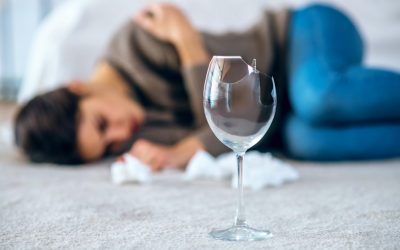Alcohol use disorder is a pattern of alcohol use that involves problems controlling your drinking, being preoccupied with alcohol or continuing to use alcohol even when it causes problems. This disorder also involves having to drink more to get the same effect or having withdrawal symptoms when you rapidly decrease or stop drinking. Alcohol use disorder includes a level of drinking that’s sometimes called alcoholism. This can be especially beneficial due to some of the severe, life-threatening side effects that can occur during alcohol withdrawal, like seizures. When surrounded by medical staff who know what they’re doing, however, the risk can be mediated and your discomfort during withdrawal can be addressed too.

Signs and symptoms of alcoholism (alcohol dependence)
As a result, regret becomes a useful way to pinpoint what’s important in someone’s life, like a spotlight illuminating areas that need attention. Recent research has shown that both regret, while initially uncomfortable, can be a powerful catalyst for change. It can provide an emotional kick that propels us to alter behaviors that aren’t serving us. The fact that regret can be harnessed to aid in behavior modification makes it particularly valuable when trying to let go of a persistent habit.
Contribute to more research that helps us to understand alcohol use
Through exploring the emotional sources of your addiction and learning coping skills to deal with stress or uncomfortable feelings, you can achieve a full recovery. If you feel that you sometimes drink too much alcohol, or your drinking is causing problems, or if your family is concerned about your drinking, talk with your health care provider. Other ways to get help include talking with a mental health professional or seeking help from a support group such as Alcoholics Anonymous or a similar type of self-help group. Alcohol is a drug, and alcoholism is every bit as damaging as drug addiction. Alcohol addiction causes changes in the body and brain, and long-term alcohol abuse can have devastating effects on your health, your career, and your relationships. Alcoholics go through physical withdrawal when they stop drinking, just like drug users experience when they quit.
How to Stop Self-Medicating Depression, Anxiety, and Stress
- Drinker’s remorse often triggers a cascade of negative thoughts that can spiral into an emotional pitfall.
- But regularly drinking more alcohol than these guidelines recommend can pose a number of health risks, including depression.
- Maybe you tossed and turned, had bizarre dreams, or woke up with your heart racing.
- Decide in advance how many drinks will be consumed and adhere strictly to this limit.
Acknowledging these feelings and their triggers is crucial for long-term mental well-being. Often, social pressures or the excitement of the moment can derail even the best-laid plans. Before heading into social situations where alcohol will be present, develop a comprehensive strategy. Decide in advance how many drinks will be consumed and adhere strictly to this limit. To ensure compliance, share this plan with a trusted friend or family member who can ensure accountability on our part. This adds a layer of social commitment to the personal goal, making it more challenging to deviate from the plan.
FAQs About Feeling Guilty After Drinking

In the Old English epic Beowulf, the “monster” Grendel is feared by everyone. He bursts into the mead hall every night, starts tearing things apart, murdering people, and drinking their blood. Millions of readers rely on HelpGuide.org for free, evidence-based resources to understand and navigate mental health challenges. For example, you may blame an ‘unfair boss’ for trouble at work or a ‘nagging wife’ for your marital issues, rather than think why can’t i control my drinking about how your drinking is contributing to the problem. While work, relationship, and financial stresses happen to everyone, an overall pattern of deterioration and blaming others may be a sign of trouble. Binge drinking can lead to reckless behavior such as violence, having unprotected sex, and driving under the influence.
Another intriguing aspect is the concept of neuroplasticity — the brain’s ability to reorganize itself by forming new neural connections or strengthening existing ones. Habitual drinking can lead to changes in neural pathways, influencing behavior and making us more susceptible to drinker’s remorse. In essence, the more frequently we experience these emotions, the more “wired” the brain becomes to enter this regretful state post-consumption. For women, drinking more than 3 drinks per day, or 7 per week, seems to be the threshold where long-term risks develop. Having more than 4 drinks per occasion is widely considered a dangerous binge.
A heavy drinking binge may even cause a life-threatening coma or death. This is of particular concern when you’re taking certain medications that also depress the brain’s function. There’s no inherent harm, however, in wanting to have a drink or two, or to occasionally enjoy a night out where you might drink. In these cases, one of the best ways to help prevent hangxiety is to be open and honest with those around you. Not everyone realizes the emotions they experience after drinking are tied to drinking in the first place.
- Getting drunk with your buddies, for example, even though you know your wife will be very upset, or fighting with your family because they dislike how you act when you drink.
- Be kind to your family and friends, and make a note that you will not make this same mistake again.
- This written record helps establish a pattern over time, which can be incredibly enlightening.
Each week parents meet to share resources and talk through the struggles of balancing child care, work responsibilities, and self-care. Even when you don’t have much time to spare, spending 15 minutes reading a good book, drawing or doodling, or even looking at cute animal videos can offer a positive distraction. Even if they don’t improve immediately, you’ll probably have an easier time doing something about them when you don’t have to deal with physical symptoms, too. It often feels very tempting (and easy) to keep drinking until you feel better, especially when you have less access than usual to more helpful coping methods.